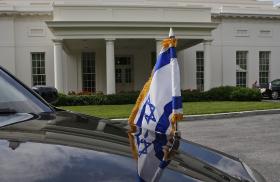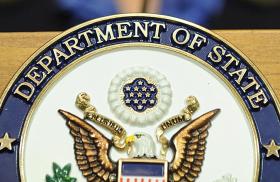Urgent regional matters -- such as Iraq and the Arab–Israeli peace process -- will dominate the agenda during Egyptian president Hosni Mubarak's visit to Washington this week, while Egypt's transition to a free-market economy and U.S.– Egypt trade ties will also receive attention. Egyptian domestic politics, however, will register little, aside from U.S. frustrations over anti-Semitism in the Egyptian press and concern about the status of Egypt's Coptic Christians. Although the regime appears quite stable, having secured a "victory" in its 1990s conflict with violent extremist groups, the state of political reform in Egypt, America's most important Arab ally, merits a closer look. That is because Egypt's long-term economic reform -- in which Washington has invested so much -- can succeed only if accompanied by meaningful political liberalization.
Islamist Politics Egypt is not going the way of Algeria, but neither is political Islam disappearing from the scene. Islamic extremist groups in Egypt are severely disabled and popularly discredited. However, occasional incidents raise flashes of concern -- such as last November's bank robbery in southern Egypt, which some suspect was the work of al-Gamaa al-Islamiyya members, or a news report in January that the Egyptian Islamic Jihad planned to end its unilateral cease-fire. The underlying socio-economic problems that helped to fuel such groups' rise persist.
The illegal but semi-tolerated Muslim Brotherhood is enjoying an upsurge in prominence, following its strong showing in the parliamentary elections of October/November 2000 (17 members of Parliament [MPs] out of 454 are Brotherhood members, the most since 1987). Perceived as a staunch supporter of Palestinian and pan-Islamic causes, the Brotherhood is the main beneficiary of popular anger over the al-Aqsa Intifada. This safety valve is currently useful for the regime. The Brotherhood continues to flex its muscles on "cultural" issues, and the government continues to defer to it. In an episode reminiscent of Islamist assaults on "secularist" thought in the 1990s, the Minister of Culture in January instantly withdrew from circulation three novels that a Brotherhood MP suggested were un-Islamic. The Brotherhood scored another success in February's elections for the Bar Association's twenty-four-member governing council, in which all twenty candidates it endorsed won. Candidates backed by the ruling National Democratic Party (NDP) failed to win a single seat in a voting process that was considered relatively fair.
The current lull in the decades-long confrontation with the regime, however, may prove short-lived, since the regime retains the upper hand. The Brotherhood enjoys influence on certain issues, especially in the socio-cultural realm, but lacks decisive national political power and, of course, skates on thin legal ice. With fresh memories of the fierce government crackdown during the recent parliamentary elections and of the military court sentences handed down against fifteen of its leading members last November, the Brotherhood's leadership is reportedly keen not to challenge the regime so brashly as to provoke a backlash. For example, they are not expected to press their desire to become a legal political party. Beyond promoting the further "Islamicization" of Egyptian culture, their legislative agenda is vague. The Brotherhood is also rumored to be mired in infighting over succession to its eighty-year-old Supreme Guide Mustafa al-Mashour.
Party Politics The fallout from the NDP's rough ride in the parliamentary elections, in which it suffered many unexpected defeats, continues. Eighteen provincial secretaries recently were sacked. While the party's old guard thinks this is sufficient, some younger members want a broader shake-up. But turning a patronage-driven body with a hazy message into a vibrant, grass-roots party within a politically disaffected populace is a daunting task. In addition, many of the "young reformers" are up-and-coming businessmen, who are pre-occupied with economic issues, not with democratization per se.
Within Parliament, independent and opposition MPs for the first time gave the NDP a serious challenge for committee chairmanships and the deputy speakership. Emboldened opposition MPs have already subjected Minister of State for Parliamentary Affairs Kamal al-Shazli to scathing questioning sessions. Yet such noise, while unpleasant for the regime, will not easily translate into concrete legislative gains. The NDP can afford to let the opposition blow off steam without serious repercussions, since it controls 398 out of 454 seats (87 percent); furthermore, the Executive can bypass Parliament and enact its legislative priorities by decree.
Nevertheless, enthusiasm about full judicial supervision over the voting process, which produced one of the cleanest elections Egypt has witnessed in years, has generated new interest in the Shura council (upper house of Parliament) elections, due in June for half of the body's 176 elected seats. In the past, no opposition parties even bothered to field candidates. The Shura council has no legislative powers. However, adding fresh faces would be an important symbolic victory for pluralism in what has been a rubber-stamp institution.
Human Rights This year's Department of State human rights report states that Egypt's human rights record improved somewhat over last year's, primarily due to a decrease in "terrorist activity by Islamic extremists" who, along with others caught in the wide net cast to stamp out security threats to the state, were the main targets of human rights abuses. However, the waning extremist challenge has prompted fresh questions by the opposition about the need for the Emergency Law, in force since 1981. Both the State Department report and a recent Amnesty International report note that torture is an ongoing problem in Egypt.
Furthermore, rights of freedom of expression and association are precarious, including for those involved in peaceful pro-democracy activities. The defense will soon begin its case in the trial of prominent democracy activist Dr. Saad ed-Din Ibrahim and twenty-seven associates of his Ibn Khaldoun Center for Development Studies (see PolicyWatch no. 503). Despite the large number of foreign observers permitted at the trial, serious concerns remain about the flimsiness of the government's case and the inherent unfairness of trying the matter in a state security court. The episode continues to cast a pall over the already skittish nongovernmental organization (NGO) community. In addition, only a clamor by the opposition press last month forced the government to backtrack on a proposed "Documents Protection Law" that would have imposed harsh penalties on anyone publishing documents falling under a vague definition of "harming national security." Finally, the government may soon decide to re-submit the Law on Associations (Law 153, or the NGO law) to Parliament. (The Supreme Constitutional Court overturned the 1999 law on a technicality.) This law was criticized for granting the Ministry of Social Affairs vast powers to control NGO funding and management.
Conclusion So far, Egypt's transition to a free-market economy has been slow but relatively steady; the political transition, however, has been halting, with the regime often taking a step backward to match each step forward. Given that the Egyptian government is betting the country's economic future largely on privatization, the information technology sector, and foreign investment, the disconnect between economics and politics cannot persist forever. Succeeding in the new global economy, as Egypt has vowed to do, requires a political culture marked by openness, rule of law, and some degree of autonomy from central control.
This disconnect was most recently evident in the congressionally-mandated U.S. Committee on International Religious Freedom's March fact-finding mission to Egypt, whose focus on the situation of Coptic Christians was lambasted in the Egyptian press and prompted local groups and officials to boycott most requests for meetings. Despite such Egyptian sensitivity to perceived U.S. "interference" in Egyptian affairs, Washington has a huge stake in political reform in Egypt. The United States should step up efforts to encourage the Mubarak government to open up more political space and protect freedom of expression and association as critical investments in Egypt's long-term stability.
Amy Hawthorne is a 2000-2001 Soref fellow at The Washington Institute.
Policy #528


